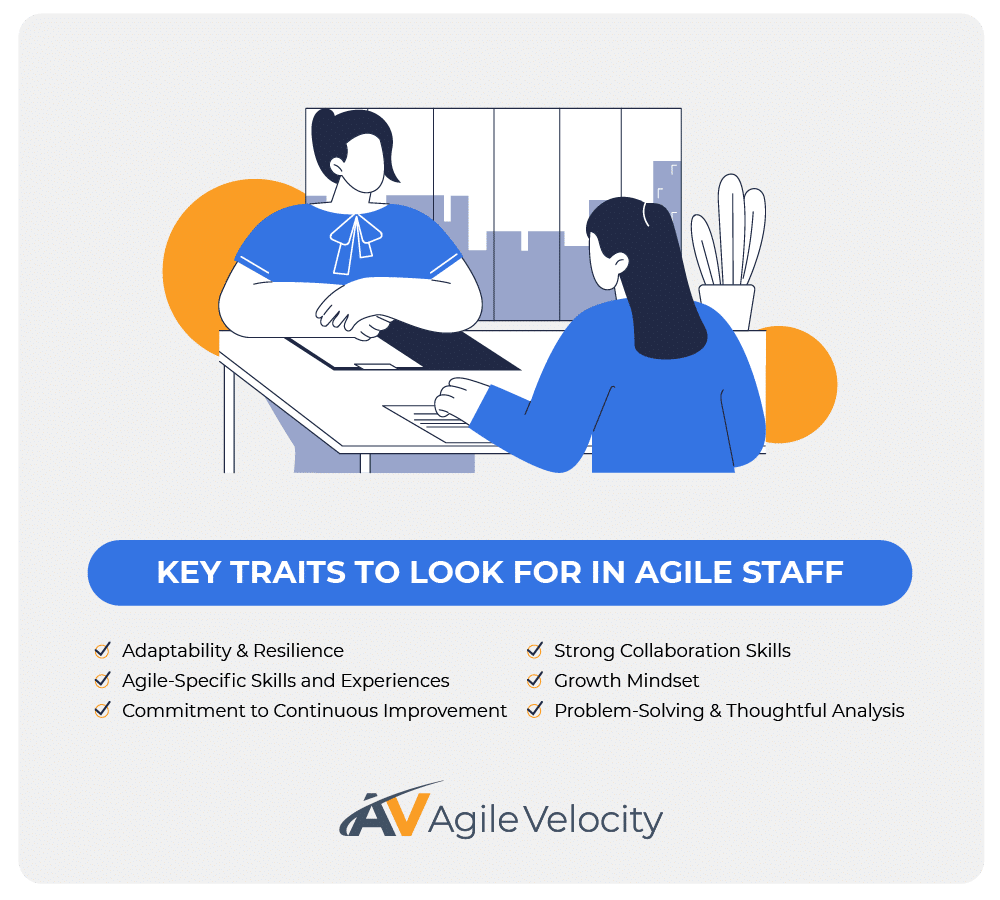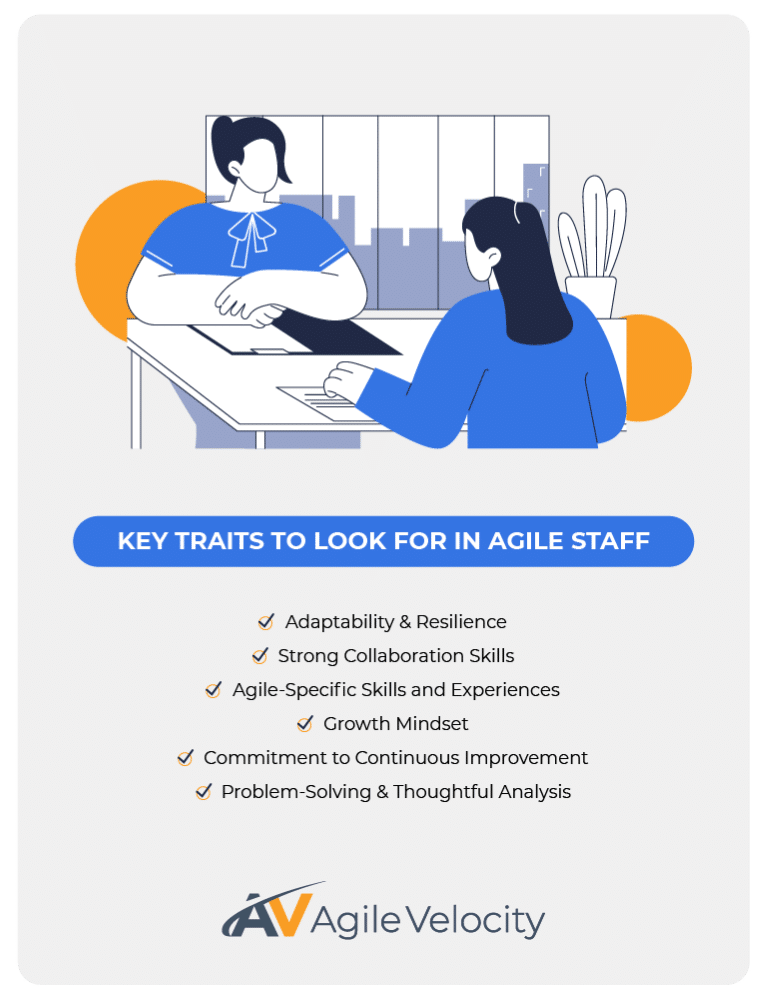In today’s dynamic business world, building a high-performing Agile team starts with selecting team members who bring the right mix of technical expertise, adaptability, and interpersonal skills. Agile staffing is not just a hiring process, it’s a strategic approach that helps drive Agile Transformation, improve workflow, and enable faster, predictable value delivery.
When organizations focus on hiring candidates who can work collaboratively, adapt quickly, and continuously improve, they set the stage for long-term success. This article provides actionable strategies to refine your Agile staffing process and empower your teams to excel. Whether your focus is on frameworks like Scrum, SAFe®, or Kanban, having the right talent is essential for any Agile Transformation.
Why Agile Staffing is Key
Creating a high-performing Agile team begins with hiring the right people. Beyond familiarity with Agile Methodologies and events like Sprints or Daily Scrum, success in Agile environments depends on individuals who thrive in collaboration, embrace change, and take shared accountability for outcomes.
Agile Transformation Options can be instrumental in helping organizations respond effectively to evolving market demands and internal challenges. By carefully selecting candidates who not only understand Agile practices but also embody a growth mindset, companies lay the foundation for a culture committed to continuous improvement and innovation.
Key Traits to Look for in Agile Staff
When building an Agile team, it is crucial to identify individuals who not only possess technical skills but also demonstrate a commitment to continuous learning and growth. Team members should exhibit strong communication skills, facilitating clear and open dialogue essential for collaboration and problem-solving. Additionally, valuing diverse perspectives and displaying resilience in the face of change are key traits that drive innovation and adaptability within Agile environments.


Adaptability and Resilience
In Agile settings, change is constant. Employees must be able to adjust rapidly when priorities shift or new challenges emerge. Adaptable team members maintain focus under pressure and are always ready to recalibrate their approach to meet evolving project needs. Resilience enables them to recover quickly from setbacks and keep the team moving forward—essential qualities during any Agile Transformation.
Strong Collaboration Skills
Agile practices thrive when team members communicate openly, share knowledge, act as peer mentors,and work together seamlessly. Candidates who excel at collaboration are comfortable interacting with diverse roles—from Scrum Master to Product Owner. They contribute constructively during Backlog Refinement, Sprint Planning and Retrospectives, ensuring that the entire team benefits from shared insights and cooperative problem-solving.
Growth Mindset and Commitment to continuous improvement
A growth mindset underpins ongoing learning and process enhancement. Ideal candidates actively seek feedback, learn from past iterations, and make incremental improvements that drive team performance. Their commitment to continuous improvement not only boosts their own productivity but also inspires others to strive for excellence, reinforcing a culture of innovation throughout the organization.
Problem-Solving and Thoughtful Analysis
Unexpected challenges are a natural part of Agile projects. Strong problem solvers analyze issues carefully, consider alternative approaches, and make decisions that align with the team’s objectives. Whether it’s fine-tuning Sprint Goals or managing Work In Progress (WIP) Limits, these skills are vital for overcoming obstacles and keeping projects on track.
Agile-Specific Skills and Experiences to Prioritize
To build a truly effective Agile team, prioritize candidates with hands-on experience in Agile frameworks like Scrum, Kanban, or SAFe®. Candidates who have successfully participated in Agile events, such as Sprint Planning, Daily Scrums, or Retrospectives, bring added value through practical knowledge and insights. Additionally, a strong understanding of Agile metrics and tools, combined with expertise in managing Agile artifacts, ensures efficient workflow and robust project management.
Proficiency in Agile Methodologies
Beyond a basic understanding of Agile, hands-on experience with frameworks such as Scrum, Kanban, or SAFe can significantly enhance team performance. Candidates should be comfortable participating in Agile events, managing elements like the Product Backlog, or setting iteration-based goals. Their practical knowledge helps ensure that principles like continuous improvement and iterative delivery are effectively put into practice.
Familiarity with Key Agile Roles
A successful Agile team benefits from clarity on roles like Scrum Master, Product Owner, and Agile Coach. Experienced candidates will not only know these roles theoretically, but will also have demonstrated success in these positions or in collaborating across them. Such experience is key to achieving smooth execution of Agile practices and ensuring proper leadership within the team. LINK TO ROLES BLOG HERE
Experience with Agile Tools and Supporting Approaches
Familiarity with Agile tools and techniques can streamline workflows. For instance, candidates who have used Kanban Boards to visualize work or manage resources through Lean Portfolio Management bring practical skills that directly impact efficiency. Furthermore, advanced technologies like AI solutions can rapidly analyze candidate data, identify skill gaps, and refine the hiring pipeline. This focus on continuous improvement helps teams adapt quickly and maintain momentum.
Build High-Performing Teams
Cultural and Organizational Fit
Aligning potential hires with your organization’s culture and values is essential for maintaining harmony and enhancing team collaboration. A successful Agile team requires not only technical proficiency but also individuals who resonate with the company’s ethos and can contribute to a positive work atmosphere. Assessing cultural fit ensures new team members are likely to thrive in your unique environment and support aligned organizational goals.
Alignment with Agile Principles
Agile is as much about culture as it is about methodology. Candidates who embrace values like transparency, trust, and empowerment naturally fit into an Agile team. Their willingness to share feedback, participate in iterative improvement, and support both individual and team growth helps create an environment where Agile practices can thrive.
Commitment to organizational agility
Successful Agile teams are also aligned with the broader organizational vision. Whether your company is shifting from traditional practices to more dynamic, efficient processes or investing in new collaborative models, hiring individuals who are open to change is crucial. Their readiness to step out of their comfort zones and engage in new ways of working ensures consistent progress toward achieving strategic goals.
Steps to Enhance Your Agile Hiring Process
Enhancing your Agile hiring process involves refining your strategies to attract the best talent who resonate with both Agile principles and organizational goals. Start by clearly defining the ideal candidate profile that encompasses not only technical expertise but also essential soft skills such as adaptability and collaboration. Incorporate diverse sourcing tactics, such as leveraging social media, networking events, and employee referrals to broaden your candidate pool and foster a rich mix of perspectives.
Define Role Requirements Clearly
Begin by outlining the specific skills, experiences, and attributes required for each Agile role. Whether you are seeking a Scrum Master to facilitate Agile events or a Product Owner to manage priorities within the Product Backlog, clarity in your job descriptions helps both candidates and hiring teams alike. Clearly identifying whether experience with frameworks like Scrum, SAFe, or Extreme Programming (XP) is needed will streamline the screening process.
Leverage Behavioral Interviews
Behavioral interviews provide insight into how candidates have navigated real-world challenges. Ask for examples that illustrate how they have handled shifting priorities, contributed in Sprint Retrospectives, or collaborated during Daily Scrum events. This approach not only evaluates technical competence but also highlights soft skills like communication and adaptability.
Incorporate Scenario-Based Questions
Scenario-based questions can further assess a candidate’s practical application of Agile principles. For example: “How would you handle overlapping priorities during Sprint Planning?” or “What steps would you take to address bottlenecks on a Kanban Board?” Such questions reveal a candidate’s strategic thinking and ability to manage real-time challenges, ensuring they can contribute effectively to your Agile team.
Use Team Simulations
Organizing team simulations or realistic exercises can be a valuable part of your hiring process. Simulated events, such as mock Sprint Planning sessions, allow you to observe how candidates interact with potential future teammates and handle dynamic situations. These exercises are instrumental in assessing how well an applicant might integrate into your team’s culture and workflows. Do these simulations just as it would be done in the normal environment, whether remote, in-person, or a hybrid.
Look for Openness to New Ways of Working
Agile environments are continuously evolving. Candidates who demonstrate curiosity and a willingness to adopt new tools and processes are a great asset. Questions about past experiences with innovative practices or adaptations to changing work conditions can help reveal whether a candidate is ready to embrace both current methods and future challenges.
Ready to Build Your High-Performing Agile Team?

Hiring with Agile principles at the forefront is essential for achieving both team cohesion and strategic success. By prioritizing traits such as adaptability, collaboration, a growth mindset, and practical Agile experience, your organization can build teams that are truly prepared for the challenges and opportunities of today’s fast-paced business environment.
Smart Agile staffing transcends simple role fulfillment—it lays the groundwork for sustainable innovation and continuous improvement. If you are ready to elevate your Agile hiring strategy and transform your team’s potential, consider partnering with experts who can guide you through every step of the process.
Ready to elevate your Agile hiring process and build a high-performing team? Explore how Agile Velocity can provide expert guidance tailored to your organization’s unique needs through our Agile staffing services. Partner with us to transform your Agile teams with strategic insights and proven methodologies that drive success. Don’t miss out on the opportunity to align your staffing efforts with Agile excellence – start your journey with Agile Velocity now!


